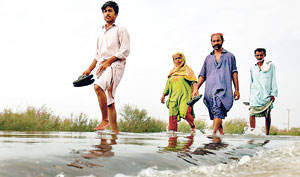SUKKUR, Pakistan Aug 14 (Reuters) - United Nations aid agencies have provided assistance to hundreds of thousands of victims of Pakistan's worst floods in decades but relief operations have yet to reach an estimated six million people.
The lives of 14 million people -- eight percent of the population -- have been disrupted by one of the worst catastrophes in Pakistan's history. Six million of them need food, shelter and water. The floods, triggered by torrential monsoon downpours just over two weeks ago, engulfed Pakistan's Indus river basin, killed more than 1,600 people.
 |
| Flood victims walk through rising waters in the flooded village of Karampur, about 70 km (43 miles) from Sukkur in Pakistan's Sindh province. REUTERS |
Pakistan's government, overwhelmed by the disaster, has been accused of being too slow to respond to the crisis with victims relying on the military and international aid agencies for help.Anger is spreading, raising the possibility that the government could face social unrest. Analysts say a military coup is unlikely because the army's priority is fighting Taliban insurgents and taking over during a disaster makes no sense.
Villages have been wiped away. Some people only have a patch of land to stand on. Fresh downpours could bring more destruction, and displacement. A U.N. statement said relief operations still need to reach six million people. Among other urgent problems, clean drinking water is needed for an initial target of six million people.
The United Nations says the floods have affected about one-third of Pakistan, an area the size of a European country.
U.N. Secretary-General Ban Ki-moon is expected to visit Pakistan over the weekend to discuss the crisis. The economic costs are staggering, making it more difficult for the government to carry out strategic spending in former Taliban bastions to win public support.
World Bank President Robert Zoellick said the floods may have destroyed about $1 billion worth of crops and that the Bank was considering reprogramming about $900 million in aid.
Wheat, cotton and sugar crops have all suffered damage in a country where agriculture is a mainstay of the economy. The International Monetary Fund has warned of major economic harm and the Finance Ministry said it would miss this year's 4.5 percent gross domestic product growth target.
|


